General form
The input is the area at the bottom of the focused panel, in which you can type a filter or a command.
Its parts are
- a filtering pattern
- a verb invocation, starting with a space or a colon (
:)
Both parts are optional.
The filtering pattern
A search pattern is made of 1 to 3 parts separated by the / character but you rarely need the two /.
The syntax is globally
<mode><pattern>[/<flags>]
The mode is either nothing (fuzzy path), just a slash (regex name) or some letters followed by a slash.
The search mode combines
- the search type: fuzzy, regex, exact, tokens
- the search object: file name, file path, file content
| mode | example query | example match | explanation |
|---|---|---|---|
| fuzzy path | abc or p/abc |
a/bac.txt |
search for "abc" in a fuzzy way in sub-paths from current tree root |
| fuzzy name | n/abc or nf/abc |
abac.txt |
search for "abc" in a fuzzy way in filenames |
| tokens name | nt/ab,cd |
dcdAbac.txt |
search for the "ab" and "cd" tokens, in whatever order (case and diacritics insensitive) |
| exact name | e/Bac or en/Bac |
ABac.txt |
search for the string "Bac" in filenames |
| regex name | /[yz]{3} or /[yz]{3}/ |
fuzzy.rs |
search for the regular expression [yz]{3} in filenames |
| regex name | /(json|xml)$/i |
thing.XML |
find files whose name ends in json or xml, case insensitive |
| regex name | /abc/i |
aBc.txt |
search for the regular expression abc with flag i in filenames |
| exact path | ep/te\/d or pe/te\/d/ |
website/docs |
search for "te/d" in sub-paths from current tree root |
| regex path | rp/\d{3}.*txt |
dir/a256/abc.txt |
search for the \d{3}.*txt regex in sub-paths from current tree root |
| tokens path | t/ab,cd |
DCD/a256/abc.txt |
search for the "ab" and "cd" tokens in sub-paths from current tree root |
| exact content | c/mask or c/mask/ |
umask = "1.0" |
search for the "mask" string in file contents |
| regex content | rc/[abc]{5}/i |
bAAAc |
search with a regular expression in file contents - i making it case insensitive |
| regex content | cr/\bzh\b |
"zh":{ |
search a word with a regular expression in file contents |
It's also possible to redefine those mode mappings.
Combining filtering patterns
Patterns can be combined with the ! (not), & (and) and | (or) operators, and parentheses if necessary.
You can for example list files whose name contains a z and whose content contains one too with
z&c/z
To display non json files containing either isize or i32, type
!/\.json$/&(c/isize/|c/i32/)
The last closing characters are often unecessary when no ambiguity is possible, so you could have typed this:
!/\.json$/&(c/isize/|c/i32
Escaping
Why escaping ?
Look at this input: a|b rm.
It's for searching files whose name contains either a a or a b, then removing the selected one.
The pattern here is a|b, it's a composite pattern.
A space or a colon starts the verb invocation.
So if you needs one of them in your pattern, you need to escape it with \.
For example
- to search for a file whose name contains a x and a colon, you type
x\: - to search for a file whose name contains a space just before a digit, you can use a regular expression:
/\ \d
The characters you use as operators and the parenthesis can be useful in patterns too, either because you want to search for them in fuzzy patterns or in file contents, or because you write non trivial regular expressions.
If you want to search for the | character (or a &, or (, or )), you can't just type it because it's used to combine elementary patterns. I needs escaping. So if you need to search for the | character in file names, you type \|.
An elementary pattern which starts with a / can only be ended with a /, a space, or a colon.
That's why you don't have to escape other characters you want to include in your elementary pattern.
This lets you type this regular expression with no unecessary escaping:
/(\d-){2}\w

Regular expression escaping rules still apply, so if you want to search with a regex for a file containing a (, you'll type /\(.
Escaping Rules
The escaping character is the antislash \.
Most often, you don't need to know more: when broot tells you it doesn't understand your pattern, it should click that your special character needs escaping and you prefix it with a \.
More precisely:
- After the first
/of a pattern, only,:,/and\need escaping. - Otherwise,
&,|,(,),\need escaping too. - When there's no ambiguity, ending characters are often unecessary
Performances
broot interprets the left operand before the right one and doesn't interpret the second one if it's not necessary.
So if you want to search your whole disk for json files containing abcd, it will be faster to use /\.json$/&c/abcd rather than c/abcd/&/\.json$/ which would look at the file name only after having scanned the content.
The verb invocation
The verb invocation is
:<verb><arguments>
or
<space><verb><arguments>
where arguments can be empty, depending on the verb's behaviour and invocation pattern.
Verbs are detailed in the Verbs & Commands chapter.
Examples
A Fuzzy Path search:
re
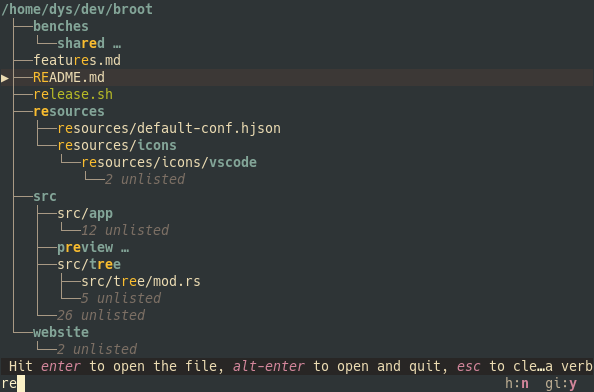
A regular expression based search:
/R
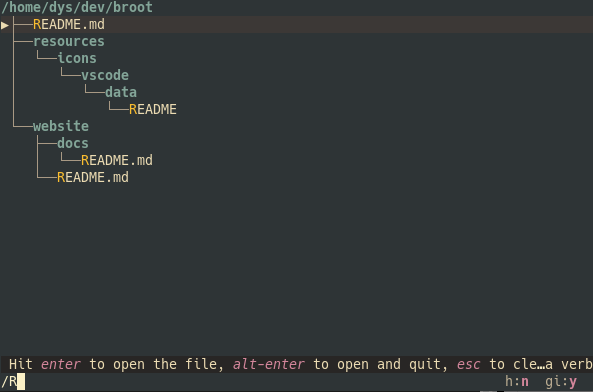
A search followed by a command without arguments:
re rm (which is equivalent to re:rm)
This is very natural: You use the search to select your element and you don't need to remove it before typing the command.
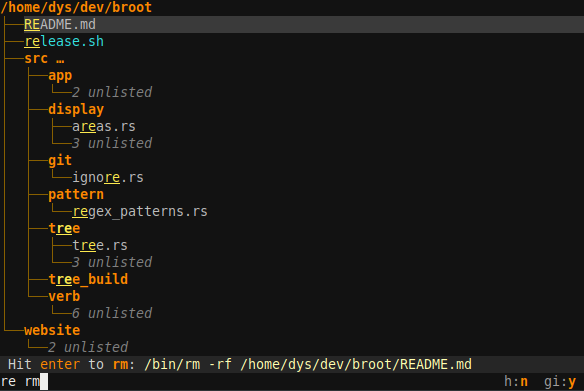
A search followed by a command taking an argument:
re mv ../regex.rs
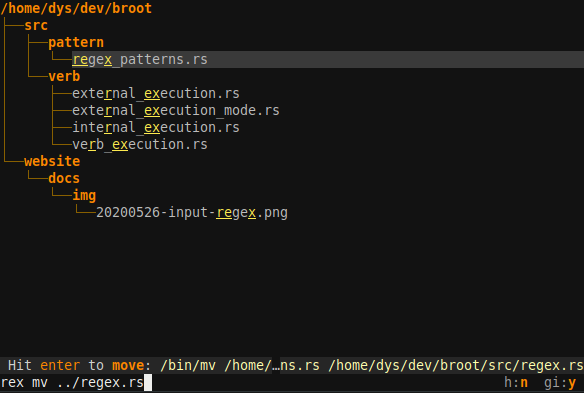
A full text search
In this case with an escaped space:
c/two\ p
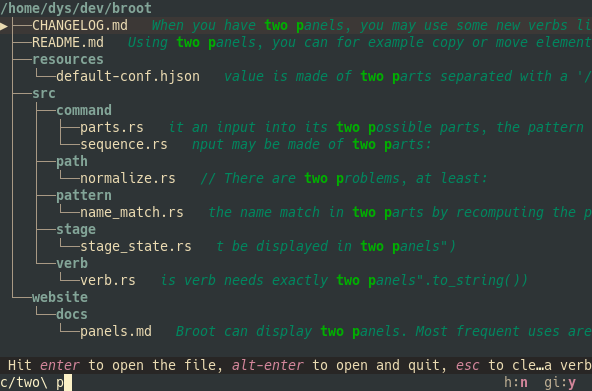
A regular expression based full text search
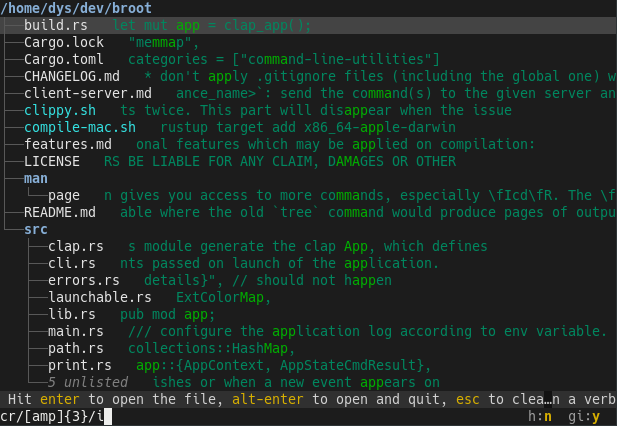
A complex composite search
Here we search for "carg" both in file names and file contents, and we exclude "lock" files:
!lock&(carg|c/carg/)
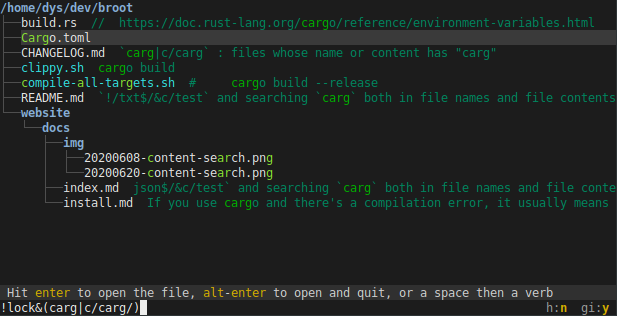
note: the / at the end of c/carg/ is necessary to tell broot that the following parenthesis isn't part of the pattern.